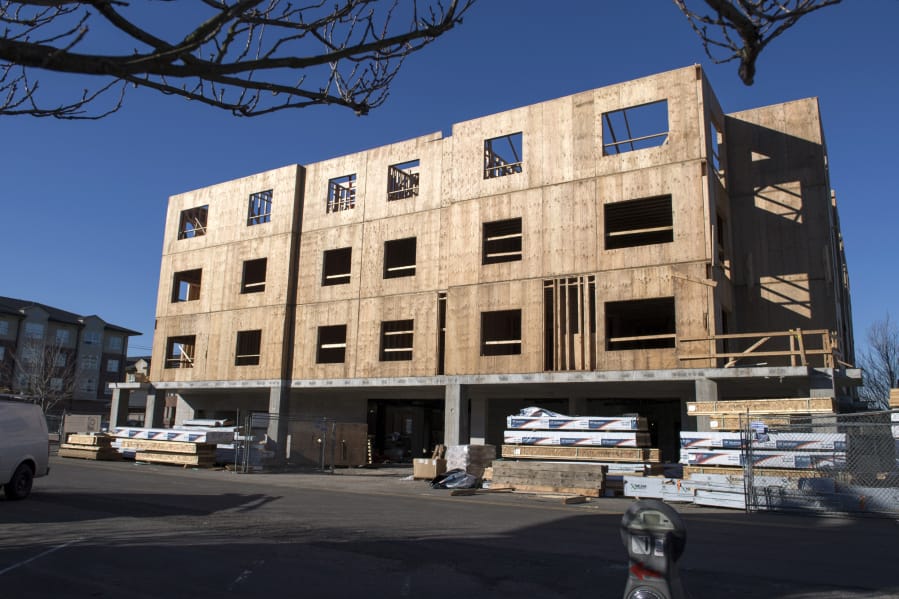There is a perception among developers that if you build a condominium you may as well be building a wasp’s nest. Veering into that market has gotten many builders stung by lawsuits over purported construction defects.
Vancouver developer Elie Kassab has heard those concerns, but isn’t worried. People constantly ask whether he will build any condos soon. And, when he looks around and sees all of the apartments rising, he said it’s a good time to do something different.
“Whenever I go to social functions or meetings, they say ‘When are the condos going to be finished?’ ” said Kassab, president of Prestige Development. “There’s a huge demand (for condos) and people are knocking on our door every day.”
Prestige Development has twin apartment buildings, paired as Our Heroes Place, going up in downtown Vancouver near the intersection Southeast Mill Plain Boulevard and D Street. One of the towers may be converted into condominiums, Kassab said, but that decision is still at least a month away.
At issue
• On one side: The passage of the Washington Condominium Act was designed to protect condo buyers from defects in construction.
• Another side: Builders say the law has an overbroad definition of a “defect,” leading quickly to lawsuits that can ensnare contractors, subcontractors, lenders and more.
• What’s next: A bill proposed in the Washington Legislature would, among other things, enact stricter requirements on condo homeowners associations that file claims against builders. It failed to pass this year but could be reintroduced in 2019.
If he does go through with it, Kassab would have only the second Clark County condominium project in development. The 24-unit complex would join the 40-unit Kirkland Tower at The Waterfront Vancouver.
Local real estate experts say this lack of construction is a problem. Condominiums are an important piece of a regional housing ecosystem because they are well-suited for first-time homebuyers. They also appeal to older homeowners looking to downsize, freeing up their single-family houses.
Developers say that condominiums could and should be on the rise in a couple years, though they will have to convince cautious lenders.
Waterfront condos
Gramor Development, the lead firm on the 32-acre The Waterfront Vancouver project, has fielded more than a thousand inquiries for condos. But the Tualatin, Ore., company hasn’t broken ground on any. There aren’t any immediate plans, either, but that could change.
“We’re really working to see if we can figure that out. I think the market is getting to a point where people are going to be willing to give it a shot,” said President Barry Cain.
The early vision for the waterfront had been to build two-thirds of the waterfront residences — roughly 3,000 units — as condominiums. Those plans were first made a decade ago, however, when lenders, architects and builders didn’t have the fears they have now.
According to builders, Washington’s current law has an overbroad definition of what constitutes a “defect.” In practice, some Clark County condominiums have been sued for everything from leaky roofs to bad acoustics. The suits can last years.
For example, builders of the Tidewater Cove Condominiums spent two years in court with the homeowners association. The initial complaint cited dozens of structural defects, including poorly installed windows, leaks in roofs and walls, noisy bathroom exhaust fans, bad bird and insect screens over exhaust vents for clothes dryers, substandard paving in the parking lot and certain plants not being “suitable” for landscaping.
Water damage and weatherproofing has been the most pervasive problem, said Tony Rafel, whose firm Rafel Law Group has represented homeowners associations. He added that a defect only makes it into their suits if they can be proven to impact the homeowners, who often put their life’s savings in owning a condo, he said.
“Builders do not always build well,” he said. “Sometimes they’re in a hurry. Sometimes their crews are unsupervised and untrained. Sometimes, despite best intentions, things are done wrong. Sometimes the intentions are actually bad and they are trying to cut corners.”
Cain said he favors protections for condo buyers, but the laws have fostered an environment of constant lawsuits. So builders pivoted to apartments, the development of which in Vancouver now outpaces single-family housing. The Waterfront Vancouver itself is slated to open 270 apartments this year.
“There were some projects that were not built as good as they could be, but the whole lawsuit thing became a little bit of an industry itself,” he said. “The laws were passed to protect buyers of condo projects. What they did was make it much more difficult to build them.”
Kassab’s conversion, if he goes through with it, offers an example of what developers face. Besides the additional construction cost to make them more suitable for condo owners, he said he would build at least an extra $10,000 into the asking price to pay for liability insurance.
Without that insurance, Kassab likely would not be able to secure financing. The insurance would cover him and potentially the lender, who continue to see condominiums as too risky.
Riverview Community Bank, for example, does not lend for condominium projects. If the bank finances the construction, and the developer gets sued, the bank could be ordered to pay damages.
Riverview already went through two such cases in Portland between 2012 and 2016, said Executive Vice President Dan Cox, and so it doesn’t plan on getting back in that position anytime soon.
“Ground-up condo construction is outside of our bank’s risk appetite right now,” he said.
Different values
When and if condos get built, they would find buyers in the local housing market.
According to the Regional Multiple Listing Service, the median priced condo sold for $195,000 in Clark County last year — about one-third cheaper than the median sale price for a single-family home.
But that bargain price may be a function of the current litigious climate. Real estate agent Terry Wollam said hopeful condo buyers are finding it difficult to get mortgage loans due to litigation.
“This reduces the buyer pool substantially to solely cash buyers and, in turn, reduces values of the condos by as much as 50 percent of their previous value,” he said.
One developer is undeterred.
Kirkland Development, known lately for building hotels in east Vancouver, has permits to build 40 high-end waterfront condos next to its upcoming Hotel Indigo.
The condos will be expensive, said owner Dean Kirkland, promising amenities such as on-site storage lockers, dog grooming, covered parking, a sports bar, a full-service restaurant and access to the hotel’s facilities.
“We’re trying to give it a Ritz-Carlton feel,” he said, though he declined to disclose the pricing.
Kirkland Development has received more than 100 inquiries for its condos, with interest coming from the Pearl District in Portland all the way up to Seattle, said project manager Dana Gardner.
“They’re just really dying to see them. The look and feel may not be for everybody. The price point may not be for everybody. But there’s only 40 of them, and there are definitely 40 of those people out there,” she said.
Lawmakers noticing
In Olympia, lawmakers seem to be taking more interest in issues around condos and condo construction.
One bill, House Bill 2831, aimed to require a majority vote of condo owners before a homeowners association could file a claim. State Rep. Tana Senn, D-Mercer Island, sponsored the bill because she said condo owners who want to sell cannot if the property is tied up in court.
The bill, co-sponsored by Rep. Brandon Vick, R-Felida, did not pass the House of Representatives.
Senn added that easing builders’ concerns would increase the supply and eventually make condominiums more affordable.
“There are condos being built — they are just super, super high-end and that’s partly because they sell them for a lot of dollars so they can cover the high liability costs,” she said. “We want to make sure condos are built that are affordable. It’s not just for high-tech millionaires in downtown Bellevue but middle-class families so they can build equity and enter the homeownership market.”
Despite the bill’s death, lobbyists say lawmakers are showing more interest in condominiums than they have in the past.
“The last few years, the legislature has been pretty quiet on the condo issue,” said Nathan Gorton, government affairs director for Washington Realtors. “This year you’re starting to see some acknowledgement of the challenges on the condo issue.”
Sleep better
Builders themselves could take the lead, some say. Complaints against condo builders has decreased for Rafel simply because they are building higher quality, he said.
“The people who are in the space now are much better builders,” than builders in years past, he said. “They’re not doing it the way it was done when people were banging up condominiums like it was nothing.”
More successful projects could even get some lenders back on board, according to Cox.
“I think as we get farther and farther away from the last recession you’ll start seeing banks or finance companies dipping their toes back into the condo market, just because we all have pretty short memories,” he said. “But it’s going to take some time.”
With a couple of months to figure out whether he will convert the apartments into condominiums, Kassab said he’s not too worried.
“If you build a quality product and you watch it every step of the way, you can sleep a lot better,” he said.




